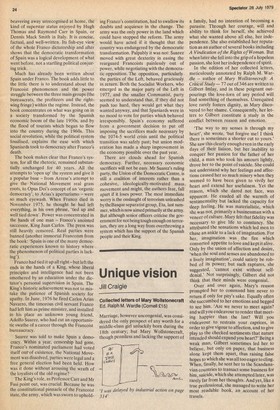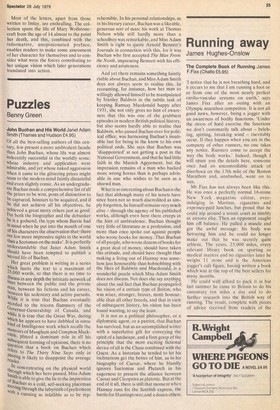Unique vision
Jill Craigie
Collected letters of Mary Wollstonecraft Ed. Ralph M. Wardle (Cornell £15) Marriage, however uncongenial, was considered the only prospect of any worth for a middle-class girl unluckily born during the 18th century; but Mary Wollstonecraft, though penniless and lacking the support of a family, had no intention of becoming a parasite. Through her courage, will and ability to think for herself, she achieved what she wanted above all else, her independence. She also established her reputation as an author of several books including A Vindication of the Rights of Woman. But when later she fell into the grip of a hopeless passion, she lost her independence of spirit.
In the edition of her collected letters, meticulously annotated by Ralph M. Wardle – author of Mary Wollstonecraft: A Critical Study-77 out of 346 are written to Gilbert Imlay, and in these poignant outpourings the love-lorn of any period will find something of themselves. Unrequited love rarely fosters dignity, as Mary discovered to her shame. Consequently, her letters to Gilbert constitute a study in the conflict between reason and emotion.
'The way to my senses is through my heart', she wrote, 'but forgive me! [think there is sometimes a shorter cut to yours.' She saw this clearly enough even in the early days of their liaison, but her inability to conquer her passion for the father of her child, a man who took his amours lightly, drove her to the point of suicide. She could not understand why her feelings and affections caused her so much misery when they seemed to have been given to vivify her heart and extend her usefulness. Yet the reason, which she dared not face, was apparent. He exuded all the warmth of sentimentality but lacked the capacity for deep feeling. He was materialistic, which she was not, primarily a businessman with a veneer of culture. Mary felt that fidelity was necessary to give life to constancy. She attributed the sensations which led men to chase an ankle to a lack of imagination. For her, imagination was the fire which converted appetite to love and kept it alive. Only by the union of affection and desire, 'when the soul and senses are abandoned to a lively imagination', could satiety be robbed of its power; but such raptures, she suggested, 'cannot exist without selfdenial.' Not surprisingly, Gilbert did not think that their minds were congenial.
Over and over again, Mary's reason prompted her to command him never to return if only for pity's sake. Equally often she succumbed to her emotions and begged to see him. 'Are we never to meet again? and will you endeavour to render that meeting happier than the last? Will you endeavour to restrain your caprices, in order to give vigour to affection, and to give play to the checked sentiments that nature intended should expand you heart?' Being a weak man, Gilbert sometimes led her to believe, but only on paper, that business alone kept them apart, thus raising false hopes to which she was all too eager to cling. When, finally, he sent her to the Scandanavian countries to transact some business for him, suicide, which she attempted later, was rarely far from her thoughts. And yet, like a true professional, she managed to write her most readable book, an account of her travels. Most of the letters, apart from those written to Imlay, are enthralling. The collection spans the life of Mary Wollstonecraft from the age of 14 almost to the point her death, and this, combined with the informative, unopinionated preface, enables readers to make some assessment of her character for themselves and to consider what were the forces contributing to her unique vision which later generations translated into action.







































 Previous page
Previous page